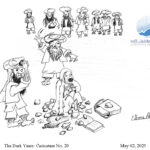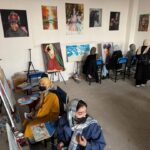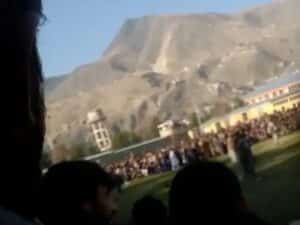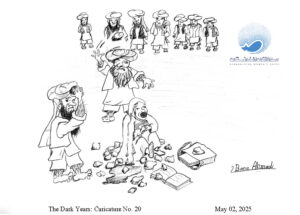By Farzana Panahi, Translated by Rostam Safdari
A historical examination of social and intellectual developments in human society reveals that feminism results from gradual and profound transformations in the epistemological, political, and cultural foundations of societies.
Starting in the medieval period, certain societies —particularly in the West—began a gradual transformation. Shifts in views on religion, power, and human nature marked this change. With the onset of the Renaissance and the subsequent Enlightenment Movement, concepts such as “reason,” “freedom,” and “individuality” began to take center stage in social thought. Thinkers, philosophers, and reformers of the time sought to rebuild social and political systems based on reason, law, and equality instead of tradition and power.
The emergence of constitutional monarchies and later modern democracies marked a transition from absolute, sacred systems to structures that were more elective and accountable. These political changes were closely tied to the rise of individual and collective awareness. It was within this context that women’s issues, which had long been marginalized in public discourse, started to emerge as a key social and philosophical concern.
A pivotal factor in this shift was the increased access to education and literacy for women. From the 18th century onward, particularly in Europe, more women gained access to formal education and cultural opportunities. This access not only elevated their social standing but also allowed them to challenge and actively critique the discriminatory systems around them. Women like Mary Wollstonecraft in England, Simone de Beauvoir in France, and later, 20th-century activists, worked to frame women’s lived experiences into legal, philosophical, and ethical frameworks, integrating these discussions into the larger public discourse.
In the 19th and 20th centuries, as concepts like civil rights, social justice, and political equality expanded, women’s rights increasingly became a subject of legislation. Movements for women’s suffrage, reforms in family law, access to education and employment, and the second and third waves of feminism all emerged from a broader movement to create a more just and inclusive society.
However, this journey was not without challenges. In many societies, both in the West and globally, there was considerable resistance to women’s participation and activism. Nonetheless, the spread of awareness, the formation of human rights organizations after World War II, and the expansion of media paved the way for women to become more active in various fields. In this context, feminism evolved from a protest movement into a broader civilizational discourse, not just about women, but about humanity as a whole. With the establishment of international human rights organizations post-World War II, women’s rights became a key measure of justice and social development.
These changes also significantly impacted the family structure. As women gained greater economic independence, traditional gender roles began to shift, prompting a re-evaluation of concepts like child-rearing, parenting, and participation in family decision-making. In this context, feminism emerged not as a rejection of the family but as an effort to rebalance power dynamics within it.
Today, feminism is part of a broader movement in which societies, especially in the modern world, are striving to rid human relationships of oppressive and discriminatory foundations and establish a new order based on mutual respect, justice, and freedom. Just as progress has been made in areas such as race, class, and religion, addressing gender inequality has become an essential and undeniable part of this ongoing transformation.
As a result, feminism should not be viewed merely as a discourse within a specific historical context, but rather as an integral part of the ongoing process of human maturation. It is a process in which awareness, experience, and activism come together to challenge one of the oldest forms of discrimination. This question remains open, and answering it is the responsibility of all those who believe in modern values and envision a more humane future.









